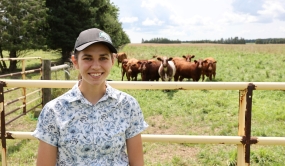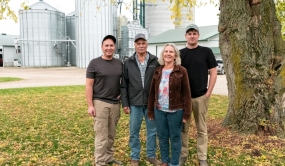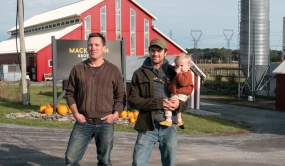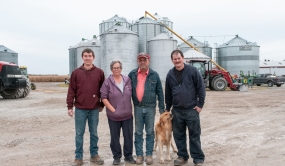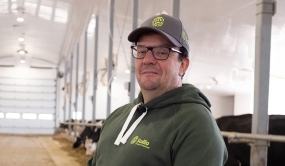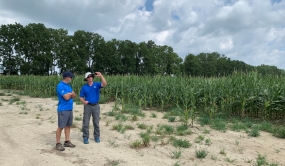Olymel : The Conquest of Markets

Interview conducted by Patrick Dupuis, agronomist, and Guylaine Gagnon
Let’s take a look into the future. What are the market trends going to be? Where will the next growth happen? How is Olymel going to position itself in this movement? An interview with Réjean Nadeau, President & CEO for the last 20 years.
Olymel pork is present in 65 countries. The United States is your most important market. Where else on the planet are the company’s sales going to develop?
Analysts agree in saying that the increase in pork consumption will mostly be in Asia. The Asians love this type of meat. And the more their incomes increase, the more they will have the ability to buy pork and choose quality cuts. We were always very strong in the Japanese market with top of the line products, and that will continue. In South Korea, our business is moving forward. Upper and middle class Chinese prefer imported loin products. This trend translates as a good business opportunity for Olymel. Finally, the Trans-Pacific Partnership will open additional doors for us in these markets for basic value-added and further processed products, especially in Vietnam where we are already present and where pork is consumed in large quantities.
Is China a difficult market to penetrate?
It is strict when it comes to certain standards, but all our facilities are approved there. We are starting to sell directly to large distributors who supply the retail, processing and restaurant markets.
You’re not the only ones who want to further develop the Asian markets. What makes you different?
We must be quick and responsive, and consistently provide a quality product. Olymel’s reputation is very good. In China, our packages have even been copied. This means that the brand is very strong.
The American Country-of-Origin-Labelling (COOL) regulation was recently brought to an end. Will Olymel be able to take advantage of this?
There are two sides to this story. The negative side is that the removal of COOL allows finished hogs and piglet production to cross the border to be marketed in the United States without a reference to the country of origin. If more pigs are shipped to the United States, the supply in Canada could decrease, which would increase the price. This situation would mostly affect Ontario, Manitoba and, to a lesser extent, Alberta.
And the positive side?
Before COOL, we were limited to selling our products to food services or processors because American retailers didn’t want to deal with the pain of labelling Canadian products. The removal of this regulation gives us access to the retail market, which is very large.
Is the future dependent on large enterprises, or small businesses adapted to niche markets?
One model doesn’t exclude the other. Olymel is the top processor at the Canadian level and the seventh or eighth in North America. But, on a global scale, if we compare ourselves to Smithfield in the United States, or some large German businesses, we are relatively small. Olymel’s agility allows it to find its place in both large and niche markets. The partnership with Groupe Robitaille for Nagano pork to be exported to Japan, which is a very niche market, is a good example.
How will the poultry sector at Olymel be developed?
Poultry represents one third of our revenues. We are the top poultry processor in Canada. Over the last 10 years, at Olymel, the profitability of this sector has always been very good. Consumption of this type of meat is constantly increasing. Other than recent acquisitions and partnerships, such as Sunnymel which increased our slaughter volumes, Olymel wants to increase its further processing activities to meet the demand that is growing a lot. Olymel is the largest supplier of further processed products in fast food chains. Therefore, we have several development projects on the table. We invested $11 million in the further processing poultry plant in Saint-Rosalie last year to increase capacity by 40%. We are also evaluating the possibility of a large investment in our plant in Brampton, Ontario.
The increase in pork will be at the international level. Will the increase of poultry be at the Canadian level?
Poultry is not exported because this production is subject to the rules of supply management. By limiting imports, the agreement signed by the previous government removes a threat that weighed heavily on the poultry industry and on supply management. This agreement allows us to maintain our markets and to continue to develop ourselves within Canada.
Is Olymel thinking about establishing a partnership with an investor to support growth?
La Coop fédérée would like to remain as the majority owner of Olymel. However, it is willing to have partners. Recently, we reached two agreements with the ATRAHAN and Robitaille companies which will become partners with Olymel. We are currently in discussions with other groups. Furthermore, it is possible that Olymel may move forward with acquisitions of companies in the United States, especially in the processed meats sector.
Is the control of processing costs in Olymel slaughterhouses an issue that you plan to address?
It is a very important issue. The agreements with ATRAHAN and Robitaille will allow us to review our business model and make significant savings in our activities in the eastern part of the country. But there is also the entire structure of the Cooperative Pork Network that we want to optimize. In the West, at the Red Deer plant, we produce more than half of the pigs we slaughter there. This helps level out the ups and downs between production and processing. Often, when it’s very profitable in production, it’s less so in processing and vice versa.
In Quebec, we can’t anticipate the same type of integration, but rather a coordination within the network since La Coop fédérée’s board entrusted Olymel with its technical services for pork production and the establishment of five group sow barns through Ferme boréales, a $50-million project with the most advanced standards in animal welfare. The first sow barn recently began its activities in Fugèreville. These advancements will help make the Quebec pork network more robust.
Is there a lot of concentration in the slaughtering activities in Quebec and Canada?
In Canada, for the number of pigs slaughtered, there are still a lot of players. Consolidation is inevitable.
What are your objectives in research and development?
We want to strengthen the culture of innovation throughout the entire business. Not only for our products, but also in the way we do things, for the environment, in human resources management, etc. to make sure that innovation becomes a reflex. Various initiatives will be implemented in the coming months and years.

